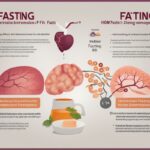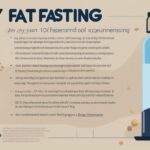Hey there, ladies! If you’ve been curious about fasting and how it can fit into your life, you’re in the right place. fasting for women is a hot topic in the health and wellness world, with many touting its benefits for weight loss, mental clarity, and overall well-being. But let’s be real—fasting isn’t a one-size-fits-all solution, and women’s bodies have unique needs and rhythms that can impact how fasting works for us. In this post, we’ll dive deep into what fasting means for women, explore the science behind it, and share practical tips to help you fast safely and effectively. Whether you’re a beginner or a seasoned faster, there’s something here for everyone looking to optimize their health through fasting women practices.
What Is Fasting, and Why Should Women Care?
Fasting is the practice of abstaining from food and, in some cases, drink for a specific period. It’s been around for centuries, often tied to spiritual or cultural traditions, but today, it’s gaining popularity for its health benefits. For women, fasting can offer perks like improved insulin sensitivity, weight management, and even better skin health. However, our hormonal cycles—think menstruation, pregnancy, or menopause—can make fasting a bit more complex compared to men. Understanding how fasting impacts female physiology is key to making it work for you. So, if you’re exploring women fasting benefits, know that it’s not just about skipping meals; it’s about timing and listening to your body.
The Science Behind Fasting for Women
Let’s get into the nitty-gritty. When you fast, your body shifts from using glucose (from food) as its primary energy source to burning stored fat through a process called ketosis. Studies suggest that intermittent fasting, a popular method among women, can reduce inflammation, improve brain function, and support cellular repair through autophagy. However, research also shows that women may respond differently to fasting due to hormones like estrogen and progesterone. For instance, fasting during certain phases of your menstrual cycle might increase stress hormones like cortisol, potentially disrupting your cycle. A 2020 study in the journal Obesity noted that while both men and women benefit from fasting, women might need shorter fasting windows to avoid negative effects on reproductive health. This is why tailored fasting plans for women are so important.
Benefits of Fasting Specifically for Women
So, what’s in it for us? Fasting can be a game-changer if done right. Here are some standout benefits that make fasting women health a topic worth exploring:
- Weight Management: Fasting can help reduce calorie intake and boost metabolism, aiding in sustainable weight loss or maintenance.
- Hormonal Balance: Some women report improved symptoms of PCOS (polycystic ovary syndrome) with fasting, as it may enhance insulin sensitivity.
- Mental Clarity: Many women experience sharper focus and reduced brain fog during fasting periods due to stabilized blood sugar levels.
- Anti-Aging Effects: Fasting triggers autophagy, a cellular cleanup process that may slow aging and improve skin health.
These benefits sound amazing, right? But remember, the key is to approach fasting with a strategy that respects your body’s unique needs.
Challenges and Considerations for Women Fasting
While the perks are enticing, fasting isn’t without its hurdles, especially for women. Our bodies are wired to protect reproductive health, which means prolonged fasting or extreme calorie restriction can sometimes signal “danger” to our systems. This might lead to irregular periods, fatigue, or even hair loss in some cases. Women in their reproductive years, pregnant or breastfeeding moms, and those in menopause need to be extra cautious. Fasting during the luteal phase (post-ovulation) might be tougher due to higher energy demands, while the follicular phase (pre-ovulation) could be more forgiving. If you’re new to women intermittent fasting, start slow and consult a healthcare provider if you have underlying conditions like thyroid issues or diabetes.
Practical Tips for Fasting as a Woman
Ready to give fasting a try? Here are some actionable tips to help you navigate fasting for female health with confidence. These strategies are designed to align with your body’s natural rhythms and keep you feeling your best:
- Sync with Your Cycle: Consider shorter fasts (like 12–14 hours) during the luteal phase and longer ones (16–18 hours) during the follicular phase for better energy balance.
- Stay Hydrated: Drink plenty of water, herbal teas, or black coffee during fasting windows to curb hunger and support detoxification.
- Break Your Fast Gently: Start with light, nutrient-dense foods like bone broth, avocado, or eggs to avoid digestive discomfort.
- Listen to Your Body: If you feel dizzy, irritable, or overly fatigued, it’s a sign to pause and reassess your fasting approach.
- Prioritize Nutrients: When you do eat, focus on protein, healthy fats, and complex carbs to fuel your body and maintain muscle mass.
These tips can make a world of difference in how you experience fasting. Remember, it’s not about pushing yourself to the limit—it’s about finding a sustainable rhythm that works for you.
How to Choose the Right Fasting Method for You
Not all fasting styles are created equal, especially when it comes to fasting women tips. Here are a few popular methods to consider, each with its own vibe. Start with what feels doable and adjust as needed. The 16/8 method, where you fast for 16 hours and eat during an 8-hour window, is often a great entry point for women because it’s flexible and mimics natural overnight fasting. The 5:2 approach, eating normally for five days and restricting calories to 500–600 on two non-consecutive days, can work well if you prefer less frequent fasting. For something gentler, try a 12/12 schedule, fasting for 12 hours (often overnight) and eating for 12. The key is experimentation—see what aligns with your lifestyle, energy levels, and health goals. And don’t forget to track how your body responds, especially if you’re monitoring female fasting results.
In wrapping up, fasting for women can be a powerful tool for health and wellness, but it’s not a magic bullet. It’s all about balance, personalization, and tuning into your body’s signals. Whether you’re drawn to fasting for weight loss, hormonal health, or simply to feel more energized, start small, stay informed, and don’t hesitate to seek guidance from a nutritionist or doctor. By understanding the unique ways fasting women can benefit and challenge us, you’re setting yourself up for success. So, are you ready to explore this journey? Drop your thoughts or questions below—I’d love to hear how fasting is working for you or what’s holding you back. Let’s keep this conversation going!






